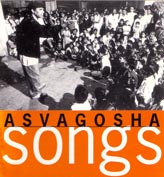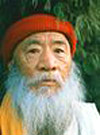Tue, 30 September 2008
The Asvagosha project was set up in India in the early 1990s as a way of developing cultural activities among poor ‘ex-Untouchable’ communities in slums and rural areas. Teams of performers visit the localities and put on performances of sketches and specially composed songs. The shows reflect the concerns that are uppermost in the minds of the people from these communities- issues such as alcoholism, domestic violence, superstition, and child health. The performers bring a level of humour and energy to their performances, ensuring that the messages are conveyed in a straightforward, unpatronising way. For more on the Karuna Trust’s vital work with ‘ex-Untouchable’ Indian Buddhists, see their website. Singers Dhammachari Ratnodaya, Dhammachari Kamalabodhi, Dhammachari Satyadeepa, Dhammachari Yashoratna, Rahul Sownone, Satish Moon Musicians Ananada Panchabhai, tabla Original Producers Dhammachari Siddhartha, Jayant Barve Digital Remastering Dhammachari Candradasa All songs composed by members of the Asvagosha project (except ‘Raho Sukhame’ – composed by Dharmarakshita) The Asvagosha project is run by Karuna Trust and Bahujan Hitay. Both are non-profit charities. Tracked version includes the following detail: 01 Asvagosha, Asvagosha 02 Jivanta Dakhala 03 Ek Bano Neka Bano 04 Dhamma Januna Ghe 05 Tumche Amuche Bandhutwache Nate 06 Andaratun Baher Ya Ho 07 Ata Tumhi Te Deepa Wha 08 Mahaparinirvana Sagari 09 Raho Sukhane Ha Manau Ethe |
Thu, 4 September 2008
Tracked version includes the following detail: 1. Introduction to Chetul Sangye Dorje; Sangharakshita’s first meeting with him 2. Early years and practice; a meeting with the Regent of Tibet 3. The meaning of Chetul Sangye Dorje’s name; a meeting with Thomas Merton 4. A teaching to Paramartha; two mind-training slogans (lohjong); practising for yourself versus practising for others; a quote from Sangharakshita 5. Real practice as love and kindness to others; commentary on mind-training by Jamgon Kontrul; the mantra of the universe; resorting to ‘the magical practice’ of spiritual individualism; going beyond yourself 6. How to practice for others; Green and White Tara; significance of Tara’s leg position; balance between self-focus and other-focus; the conflict of choice 7. Be friendly even when you can’t be happy; green, nature, and remaining open 8. Practising together, in numbers; all beings as White Tara; drawing strength from communal practice 9. Don’t settle for a comfortable life; White Tara as a young girl; settling down; Chetul Sangye Dorje and the meat-eating teacher’s disciple 10. Conclusion – Tara as embodiment of practice for others; not allowing our Buddhism to become self-indulgence |
Free Buddhist Audio

Categories
DharmabytesFree Buddhist Audio
Podcasts
Buddhism
FBA Podcast
Archives
AprilMarch
February
January
December
November
October
September
August
July
June
May
April
March
February
January
December
November
October
September
August
July
June
May
April
March
February
January
December
November
October
September
August
July
June
May
April
March
February
January
December
November
October
September
August
July
June
May
April
March
February
January
December
November
October
September
August
July
June
May
April
March
February
January
December
November
June
May
April
March
February
January
December
August
June
April
February
January
December
October
July
June
May
April
March
February
January
December
November
October
September
August
July
June
May
April
March
February
January
December
November
October
September
August
July
June
May
April
March
February
January
December
November
October
September
August
July
June
May
April
March
February
January
December
November
October
September
August
July
June
May
April
March
February
January
December
November
October
September
August
July
June
May
April
March
February
January
December
November
October
September
August
June
May
September
May
January
September
June
May
January
December
November
September
July
June
April
February
January
December
November
October
September
July
May
April
March
February
January
November
September
August
July
| S | M | T | W | T | F | S |
|---|---|---|---|---|---|---|
| 1 | 2 | 3 | 4 | 5 | 6 | |
| 7 | 8 | 9 | 10 | 11 | 12 | 13 |
| 14 | 15 | 16 | 17 | 18 | 19 | 20 |
| 21 | 22 | 23 | 24 | 25 | 26 | 27 |
| 28 | 29 | 30 | ||||
Syndication



